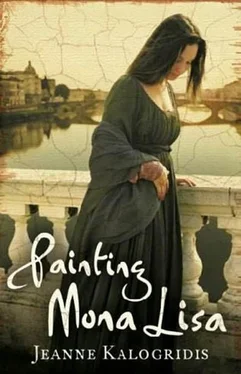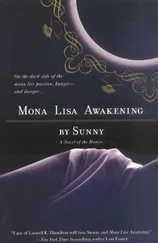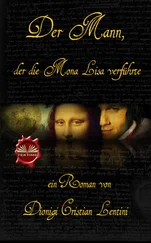“And if he isn’t?”
My father stared ahead at his sturdy grandson. “Then Florence will be placed under papal interdict. No Christian city will be allowed to do business with us unless we turn over Savonarola for punishment. But that won’t happen.” He reached for my hand to comfort me.
I did not mean to pull away, but could not stop myself. His eyes filled with hurt.
“You have been angry with me. I don’t blame you, for all I’ve done-terrible things. Things I pray God will forgive, though I long ago gave up any hope of Heaven.”
“I’m not angry,” I said. “I want only one thing: for us to leave Florence with Matteo. I can’t bear it here any longer. It’s growing too dangerous.”
“It’s true,” he admitted sadly. “But right now, it’s impossible. When they found Lamberto dell’Antello, the Lord Priors became crazed. Every one of them is a piagnone now and out for blood. They’ve closed all nine gates of the city: No one can come in, no one can go out; every letter is intercepted, read by the Council of Eight. They are questioning everyone, looking for Medici spies. Were it not for my usefulness to Francesco, they would question us.” His voice grew hoarse. “They will destroy the Bigi -every man who looked kindly on Lorenzo or his sons. And they will have Bernardo del Nero’s head.”
“No,” I whispered. Bernardo del Nero was one of Florence’s most revered citizens, a longtime intimate of Lorenzo de’ Medici. He was a strong, clearheaded seventy-five years of age, childless and widowed, and so he had devoted his life to the government of the city. He had served with distinction as gonfaloniere, and was irreproachably honest. So well liked was he that even the Signoria respected and tolerated his political position as head of the Bigi . “They wouldn’t dare hurt him! No citizen would stand for it.”
But I was even more worried for Leonardo, who was effectively trapped within the city, unable to communicate with the outside.
My father was shaking his head. “They will have to stand for it. The appearance of Lamberto dell’Antello has filled every piagnone ’s heart with fear. After the food riots in the Piazza del Grano, the Signoria is desperate to stifle any more cries of ‘palle, palle.’ ”
“But when Piero was ousted,” I said, “Savonarola called for mercy for all the friends of the Medici. He insisted that everyone be forgiven and pardoned.”
My father looked out across the garden, down the cobblestone path lined with blooming rosebushes and sculpted boxwoods, at his grandson, currently distracted by an unfortunate beetle. The sight should have gladdened him; instead, his eyes grew haunted.
“There will be no mercy now,” he said, with the conviction of a man who held secrets. “And no hope. There will only be blood.”
I wanted desperately to go to Santissima Annunziata, to warn Leonardo of the imminent peril to Bernardo del Nero and his political party, but Francesco would not hear of me leaving the house to pray-especially when it meant going to the family chapel, which stood across from the Ospedale degli Innocenti, where many of the sick were housed. And no amount of arguing could convince Claudio to disobey his master’s orders.
So I remained housebound. Francesco’s letters had all spoken of the Bigi as enemies who must be contained; now it was clear that they must be destroyed. I trusted Leonardo knew more about the danger than I did.
In the meantime, I stole onto my balcony alone and unsheathed my knife. My opponent was no longer the third man, the murderer of my true father. He was Francesco; he was the writer of the letters-the murderers of my beloved Giuliano. Night after night, I wielded my blade. Night after night, I killed them both, and took comfort in it.
Arrests were made; the accused were tortured. In the end, five men were held and brought before the Signoria and the Great Council for sentencing: the august Bernardo del Nero; Lorenzo Tornabuoni, Piero’s young cousin, who, though titular head of the Bigi , was nonetheless a much-loved citizen and a pious piagnone; Niccolò Ridolfi, an older man whose son had married Lorenzo’s daughter Contessina; Giannozzo Pucci, a young friend of Piero’s; and Giovanni Cambi, who had had many business dealings with the Medici.
Pity! supporters cried, certain that the sentences would be light and, in the case of Bernardo del Nero, commuted. The accused were all admired, upright citizens; their confessions-that they were actively involved in arranging for Piero de’ Medici’s return as the city’s self-proclaimed ruler-had been elicited under the most brutal torture.
The people looked to Savonarola for guidance. Surely the friar would once again call for forgiveness, forbearance.
But Fra Girolamo was too distracted by his efforts to placate an angry Pope. He could no longer be bothered, he said publicly, with political matters. “Let them all die or be expelled. It makes no difference to me.”
His words were repeated thousands of times by followers whose eyes were troubled, whose voices were hushed.
Three hours before dawn on the morning of the twenty-seventh of August, Zalumma and I were startled from slumber by pounding on my chamber door. Zalumma rolled out of her cot and opened the door to find Isabella, disheveled and squinting in the light shed by the taper in her hand. Still bewildered by sleep, I moved into the doorway and stared at her.
“Your husband summons you,” she said. “He says, ‘Dress quickly, for a somber occasion, and come downstairs.’”
I frowned and rubbed my eyes. “And Zalumma?” I could hear her behind me, fumbling for the flint to light the lamp.
“Only you are to come.”
As Zalumma laced me into a modest gown of gray silk embroidered with black thread, I began to worry. What possible “somber occasion” required that I be wakened in the middle of the night? Perhaps someone had died; I thought at once of my father. Savonarola’s excommunication left him in his masters’ bad graces. Had they decided at last to be rid of him?
The air was heavy, warm, and still; I had slept fitfully because of the heat. By the time I was fully dressed, my breasts and armpits were damp.
I left Zalumma and went down the stairs, stopping one level below to visit the guest chambers, where my father now slept. At the closed door, I paused-but my desperation overcame all notions of courtesy. I opened the door just long enough to peer past the antechamber into the bedroom and confirm that my father lay sleeping within.
I closed the door quietly, gratefully, and went downstairs to Francesco.
He was pacing by the front entrance, fully alert and restless. I could not have described him as happy, but in his expression and eyes I saw nervous triumph, a dark joy. It was then I realized that we were waiting for Claudio, that something so important was happening that Francesco was willing to risk exposing himself and his wife to plague.
“Has someone died?” I asked, with a good wife’s gentle concern.
“There is no point in discussing it with you now; you will only become agitated, as women do about such matters. You will see soon enough where we are going. I ask only that you contain yourself, that you exert as much bravery as you are able. I ask that you make me proud.”
I looked at him with dawning fear. “I will do my best.”
He gave a grim little smile and escorted me out to the carriage, where Claudio and the horses waited. The air outside was stifling, without hint of coolness. We did not speak during the ride. I stared out at the dark streets, my dread increasing as we rolled east toward the Duomo, then relentlessly south.
Читать дальше
Конец ознакомительного отрывка
Купить книгу












